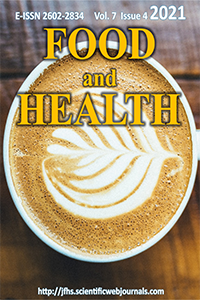Research Article
Abstract
References
- Ahluwalia, B., Moraes, L., Magnusson, M. K., Öhman, L. (2018). Immunopathogenesis of inflammatory bowel disease and mechanisms of biological therapies. Scandinavian Journal of Gastroenterology, 53(4), 379-389. https://doi.org/10.1080/00365521.2018.1447597
- Bailey, J. (2017). PTH-082 Dysregulated polyamines in the inflammatory bowel disease gut-a novel therapeutic target. Gut, 66(2), A247. Calder, P.C. (2012). Long-chain fatty acids and inflammation. Proceedings of the Nutrition Society, 71(2), 284-289. https://doi.org/10.1017/S0029665112000067
- Dai, Z., Wu, Z., Wang, J., Wang, X., Jia, S., Bazer, F. W., Wu, G. (2014). Analysis of polyamines in biological samples by HPLC involving pre-column derivatization with o-phthalaldehyde and N-acetyl-L-cysteine. Amino acids, 46(6), 1557-1564. https://doi.org/10.1007/s00726-014-1717-z
- Gao, J.-H., Guo, L.-J., Huang, Z.-Y., Rao, J., Tang, C.-W. (2013). Roles of cellular polyamines in mucosal healing in the gastrointestinal tract. Journal of Physiology and Pharmacology : An Official Journal of the Polish Physiological Society, 64, 681-693.
- Gong, D., Gong, X., Wang, L., Yu, X., Dong, Q. (2016). Involvement of Reduced Microbial Diversity in Inflammatory Bowel Disease. Gastroenterology Research and Practice, 2016, 6951091. https://doi.org/10.1155/2016/6951091
- González-Castro, A. M., Martínez, C., Salvo-Romero, E., Fortea, M., Pardo-Camacho, C., Pérez-Berezo, T., Alonso-Cotoner, C., Santos, J., & Vicario, M. (2017). Mucosal pathobiology and molecular signature of epithelial barrier dysfunction in the small intestine in irritable bowel syndrome. Journal of Gastroenterology and Hepatology, 32(1), 53-63. https://doi.org/10.1111/jgh.13417
- Hesterberg, R.S., Cleveland, J.L., Epling-Burnette, P.K. (2018). Role of Polyamines in Immune Cell Functions. Medical Sciences (Basel, Switzerland), 6(1), 22. https://doi.org/10.3390/medsci6010022
- Joyce, S. (2000). Natural T cells: Cranking up the immune system by prompt cytokine secretion. Proceedings of the National Academy of Sciences, 97(13), 6933-6935. https://doi.org/10.1073/pnas.97.13.6933
- Lee, S.H., Kwon, J.E., Cho, M.-L. (2018). Immunological pathogenesis of inflammatory bowel disease. Intestinal Research, 16(1), 26-42. https://doi.org/10.5217/ir.2018.16.1.26
- Lee, S.H. (2015). Intestinal permeability regulation by tight junction: implication on inflammatory bowel diseases. Intestinal Research, 13(1), 11-18. https://doi.org/10.5217/ir.2015.13.1.11
- Linsalata, M., Russo, F., Berloco, P., Valentini, A., Caruso, M., Simone, C., Barone, M., Polimeno, L., Di Leo, A. (2005). Effects of Probiotic Bacteria (VSL#3) on the Polyamine Biosynthesis and Cell Proliferation of Normal Colonic Mucosa of Rats. In Vivo (Athens, Greece), 19, 989-995.
- Martín, R., Chain, F., Miquel, S., Lu, J., Gratadoux, J.-J., Sokol, H., Verdu, E. F., Bercik, P., Bermúdez-Humarán, L. G., Langella, P. (2014). The commensal bacterium Faecalibacterium prausnitzii is protective in DNBS-induced chronic moderate and severe colitis models. Inflammatory Bowel Diseases, 20(3), 417-430. https://doi.org/10.1097/01.MIB.0000440815.76627.64
- Ng, S.C., Shi, H.Y., Hamidi, N., Underwood, F.E., Tang, W., Benchimol, E.I., Panaccione, R., Ghosh, S., Wu, J.C.Y., Chan, F.K.L., Sung, J.J.Y., Kaplan, G.G. (2018). Worldwide incidence and prevalence of inflammatory bowel disease in the 21st century: a systematic review of population-based studies. Lancet (London, England), 390(10114), 2769-2778. https://doi.org/10.1016/S0140-6736(17)32448-0
- Nitta, T., Igarashi, K., Yamashita, A., Yamamoto, M., Yamamoto, N. (2001). Involvement of polyamines in B cell receptor-mediated apoptosis: spermine functions as a negative modulator. Experimental Cell Research, 265(1), 174-183. https://doi.org/10.1006/excr.2001.5177
- Park, M.H., Igarashi, K. (2013). Polyamines and their metabolites as diagnostic markers of human diseases. Biomolecules & Therapeutics, 21(1), 1-9. https://doi.org/10.4062/biomolther.2012.097
- Parker, E.A., Roy, T., D’Adamo, C.R., Wieland, L.S. (2018). Probiotics and gastrointestinal conditions: An overview of evidence from the Cochrane Collaboration. Nutrition, 45, 125-134.e11. https://doi.org/https://doi.org/10.1016/j.nut.2017.06.024
- Pegg, A.E. (2009). Mammalian polyamine metabolism and function. IUBMB Life, 61(9), 880-894. https://doi.org/10.1002/iub.230
- Rossi, G., Cerquetella, M., Scarpona, S., Pengo, G., Fettucciari, K., Bassotti, G., Jergens, A. E., & Suchodolski, J. S. (2018). Effects of probiotic bacteria on mucosal polyamines levels in dogs with IBD and colonic polyps: a preliminary study. Beneficial Microbes, 9(2), 247-255. https://doi.org/10.3920/BM2017.0024
- Rossi, G., Cerquetella, M., Pengo, G., Mari, S., Balint, E., Bassotti, G., Manolescu, N. (2015). Immunohistochemical expression of ornithine decarboxylase, diamine oxidase, putrescine, and spermine in normal canine enterocolic mucosa, in chronic colitis, and in colorectal cancer. BioMed Research International, 2015, 1-8. https://doi.org/10.1155/2015/172756
- Scaioli, E., Liverani, E., Belluzzi, A. (2017). The imbalance between n-6/n-3 polyunsaturated fatty acids and inflammatory bowel disease: A comprehensive review and future therapeutic perspectives. International Journal of Molecular Sciences, 18(12). https://doi.org/10.3390/ijms18122619
- Shi, N., Li, N., Duan, X., Niu, H. (2017). Interaction between the gut microbiome and mucosal immune system. Military Medical Research, 4, 14. https://doi.org/10.1186/s40779-017-0122-9
- Uemura, T., Gerner, E. W. (2011). Polyamine transport systems in mammalian cells and tissues. Methods in Molecular Biology (Clifton, N.J.), 720, 339-348. https://doi.org/10.1007/978-1-61779-034-8_21
- Vidal-Lletjós, S., Beaumont, M., Tomé, D., Benamouzig, R., Blachier, F., Lan, A. (2017). Dietary protein and amino acid supplementation in inflammatory bowel disease course: What impact on the colonic mucosa? Nutrients, 9(3). https://doi.org/10.3390/nu9030310
- Weiss, T. S., Herfarth, H., Obermeier, F., Ouart, J., Vogl, D., Schölmerich, J., Jauch, K.-W., Rogler, G. (2004). Intracellular polyamine levels of intestinal epithelial cells in inflammatory bowel disease. Inflammatory Bowel Diseases, 10(5), 529-535. https://doi.org/10.1097/00054725-200409000-00006
- Yakoob, J., Abbas, Z. (2016). Role of omega-3 fatty acids in irritable bowel Synd rome (IBS). international Journal of Pharmacological Research, 6, 271-277.
The combined supplementation of omega-3 fatty acids and probiotics decreased the levels of serum polyamines in experimental colitis
Abstract
Polyamines play an important role in the maintenance of intestinal permeability. Therefore we aimed to determine the effects of probiotics and omega 3 fatty acids on serum polyamine levels in colitis. Fifty BALB/c mice were randomly grouped as normal, colitis with no treatment applied, colitis treated by probiotics (VSL#3), colitis treated by omega-3, and colitis treated by both probiotics and omega-3. Experimental colitis was induced by injection of 200 mg/kg 2,4-Dinitrobenzenesulfonic acid (DNBS). The probiotic and the omega-3 fatty acid supplements were applied daily by oral gavage. Serum polyamine levels were measured with high performance liquid chromatography (HPLC). In each group, the levels of serum polyamines are the highest in spermidine and the least in spermine. Bowel inflammation in experimentally induced colitis mice resulted in lower serum polyamine concentrations. In probiotic and omega 3 fatty acid supplemented group significant decreases were observed for spermine and spermidine (p<0.001), while no significant changes were obtained for putrescine. Combined supplementation of probiotics and omega-3 fatty acids for 10 days in colitis mice significantly decreased the serum levels of spermine and spermidine.
References
- Ahluwalia, B., Moraes, L., Magnusson, M. K., Öhman, L. (2018). Immunopathogenesis of inflammatory bowel disease and mechanisms of biological therapies. Scandinavian Journal of Gastroenterology, 53(4), 379-389. https://doi.org/10.1080/00365521.2018.1447597
- Bailey, J. (2017). PTH-082 Dysregulated polyamines in the inflammatory bowel disease gut-a novel therapeutic target. Gut, 66(2), A247. Calder, P.C. (2012). Long-chain fatty acids and inflammation. Proceedings of the Nutrition Society, 71(2), 284-289. https://doi.org/10.1017/S0029665112000067
- Dai, Z., Wu, Z., Wang, J., Wang, X., Jia, S., Bazer, F. W., Wu, G. (2014). Analysis of polyamines in biological samples by HPLC involving pre-column derivatization with o-phthalaldehyde and N-acetyl-L-cysteine. Amino acids, 46(6), 1557-1564. https://doi.org/10.1007/s00726-014-1717-z
- Gao, J.-H., Guo, L.-J., Huang, Z.-Y., Rao, J., Tang, C.-W. (2013). Roles of cellular polyamines in mucosal healing in the gastrointestinal tract. Journal of Physiology and Pharmacology : An Official Journal of the Polish Physiological Society, 64, 681-693.
- Gong, D., Gong, X., Wang, L., Yu, X., Dong, Q. (2016). Involvement of Reduced Microbial Diversity in Inflammatory Bowel Disease. Gastroenterology Research and Practice, 2016, 6951091. https://doi.org/10.1155/2016/6951091
- González-Castro, A. M., Martínez, C., Salvo-Romero, E., Fortea, M., Pardo-Camacho, C., Pérez-Berezo, T., Alonso-Cotoner, C., Santos, J., & Vicario, M. (2017). Mucosal pathobiology and molecular signature of epithelial barrier dysfunction in the small intestine in irritable bowel syndrome. Journal of Gastroenterology and Hepatology, 32(1), 53-63. https://doi.org/10.1111/jgh.13417
- Hesterberg, R.S., Cleveland, J.L., Epling-Burnette, P.K. (2018). Role of Polyamines in Immune Cell Functions. Medical Sciences (Basel, Switzerland), 6(1), 22. https://doi.org/10.3390/medsci6010022
- Joyce, S. (2000). Natural T cells: Cranking up the immune system by prompt cytokine secretion. Proceedings of the National Academy of Sciences, 97(13), 6933-6935. https://doi.org/10.1073/pnas.97.13.6933
- Lee, S.H., Kwon, J.E., Cho, M.-L. (2018). Immunological pathogenesis of inflammatory bowel disease. Intestinal Research, 16(1), 26-42. https://doi.org/10.5217/ir.2018.16.1.26
- Lee, S.H. (2015). Intestinal permeability regulation by tight junction: implication on inflammatory bowel diseases. Intestinal Research, 13(1), 11-18. https://doi.org/10.5217/ir.2015.13.1.11
- Linsalata, M., Russo, F., Berloco, P., Valentini, A., Caruso, M., Simone, C., Barone, M., Polimeno, L., Di Leo, A. (2005). Effects of Probiotic Bacteria (VSL#3) on the Polyamine Biosynthesis and Cell Proliferation of Normal Colonic Mucosa of Rats. In Vivo (Athens, Greece), 19, 989-995.
- Martín, R., Chain, F., Miquel, S., Lu, J., Gratadoux, J.-J., Sokol, H., Verdu, E. F., Bercik, P., Bermúdez-Humarán, L. G., Langella, P. (2014). The commensal bacterium Faecalibacterium prausnitzii is protective in DNBS-induced chronic moderate and severe colitis models. Inflammatory Bowel Diseases, 20(3), 417-430. https://doi.org/10.1097/01.MIB.0000440815.76627.64
- Ng, S.C., Shi, H.Y., Hamidi, N., Underwood, F.E., Tang, W., Benchimol, E.I., Panaccione, R., Ghosh, S., Wu, J.C.Y., Chan, F.K.L., Sung, J.J.Y., Kaplan, G.G. (2018). Worldwide incidence and prevalence of inflammatory bowel disease in the 21st century: a systematic review of population-based studies. Lancet (London, England), 390(10114), 2769-2778. https://doi.org/10.1016/S0140-6736(17)32448-0
- Nitta, T., Igarashi, K., Yamashita, A., Yamamoto, M., Yamamoto, N. (2001). Involvement of polyamines in B cell receptor-mediated apoptosis: spermine functions as a negative modulator. Experimental Cell Research, 265(1), 174-183. https://doi.org/10.1006/excr.2001.5177
- Park, M.H., Igarashi, K. (2013). Polyamines and their metabolites as diagnostic markers of human diseases. Biomolecules & Therapeutics, 21(1), 1-9. https://doi.org/10.4062/biomolther.2012.097
- Parker, E.A., Roy, T., D’Adamo, C.R., Wieland, L.S. (2018). Probiotics and gastrointestinal conditions: An overview of evidence from the Cochrane Collaboration. Nutrition, 45, 125-134.e11. https://doi.org/https://doi.org/10.1016/j.nut.2017.06.024
- Pegg, A.E. (2009). Mammalian polyamine metabolism and function. IUBMB Life, 61(9), 880-894. https://doi.org/10.1002/iub.230
- Rossi, G., Cerquetella, M., Scarpona, S., Pengo, G., Fettucciari, K., Bassotti, G., Jergens, A. E., & Suchodolski, J. S. (2018). Effects of probiotic bacteria on mucosal polyamines levels in dogs with IBD and colonic polyps: a preliminary study. Beneficial Microbes, 9(2), 247-255. https://doi.org/10.3920/BM2017.0024
- Rossi, G., Cerquetella, M., Pengo, G., Mari, S., Balint, E., Bassotti, G., Manolescu, N. (2015). Immunohistochemical expression of ornithine decarboxylase, diamine oxidase, putrescine, and spermine in normal canine enterocolic mucosa, in chronic colitis, and in colorectal cancer. BioMed Research International, 2015, 1-8. https://doi.org/10.1155/2015/172756
- Scaioli, E., Liverani, E., Belluzzi, A. (2017). The imbalance between n-6/n-3 polyunsaturated fatty acids and inflammatory bowel disease: A comprehensive review and future therapeutic perspectives. International Journal of Molecular Sciences, 18(12). https://doi.org/10.3390/ijms18122619
- Shi, N., Li, N., Duan, X., Niu, H. (2017). Interaction between the gut microbiome and mucosal immune system. Military Medical Research, 4, 14. https://doi.org/10.1186/s40779-017-0122-9
- Uemura, T., Gerner, E. W. (2011). Polyamine transport systems in mammalian cells and tissues. Methods in Molecular Biology (Clifton, N.J.), 720, 339-348. https://doi.org/10.1007/978-1-61779-034-8_21
- Vidal-Lletjós, S., Beaumont, M., Tomé, D., Benamouzig, R., Blachier, F., Lan, A. (2017). Dietary protein and amino acid supplementation in inflammatory bowel disease course: What impact on the colonic mucosa? Nutrients, 9(3). https://doi.org/10.3390/nu9030310
- Weiss, T. S., Herfarth, H., Obermeier, F., Ouart, J., Vogl, D., Schölmerich, J., Jauch, K.-W., Rogler, G. (2004). Intracellular polyamine levels of intestinal epithelial cells in inflammatory bowel disease. Inflammatory Bowel Diseases, 10(5), 529-535. https://doi.org/10.1097/00054725-200409000-00006
- Yakoob, J., Abbas, Z. (2016). Role of omega-3 fatty acids in irritable bowel Synd rome (IBS). international Journal of Pharmacological Research, 6, 271-277.
There are 25 citations in total.
Details
| Primary Language | English |
|---|---|
| Subjects | Food Engineering |
| Journal Section | Research Articles |
| Authors | |
| Publication Date | October 1, 2021 |
| Submission Date | March 21, 2021 |
| Published in Issue | Year 2021 Volume: 7 Issue: 4 |
Journal is licensed under a
CreativeCommons Attribtion-ShareAlike 4.0 International Licence 


Diamond Open Access refers to a scholarly publication model in which journals and platforms do not charge fees to either authors or readers.
Open Access Statement:
This is an open access journal which means that all content is freely available without charge to the user or his/her institution. Users are allowed to read, download, copy, distribute, print, search, or link to the full texts of the articles, or use them for any other lawful purpose, without asking prior permission from the publisher or the author. This is in accordance with the BOAI definition of open access.
Archiving Policy:
Archiving is done according to ULAKBİM "DergiPark" publication policy (LOCKSS).

